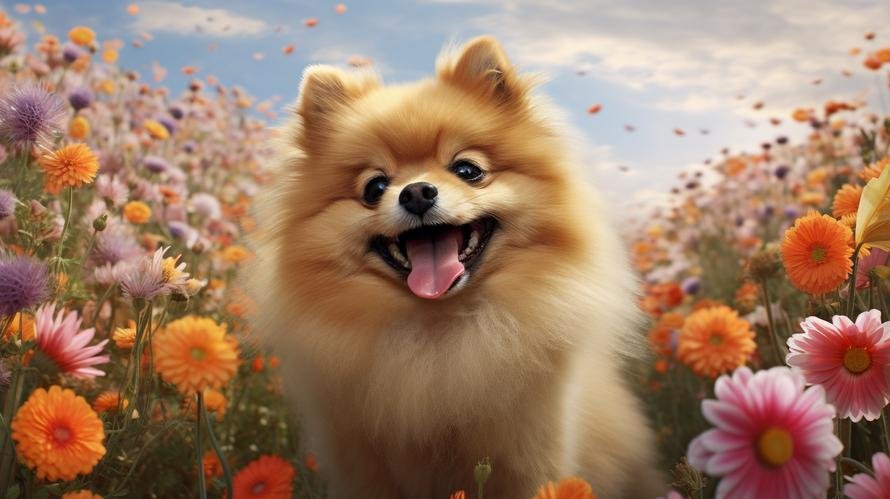Imagine coming across an adorable mini lion romping around in a beautiful lawn; that’s exactly what a Pomeranian looks like – a fun-sized, energy-packed, fluffy lion. This breed is generally a favorite amongst dog lovers not just for their cute appearance, but also for their energetic, playful, and sometimes even feisty attitudes. However, owning them comes with its own unique set of challenges, especially in their dietary needs.
Pomeranians belong to the Toy Group breed category and these petite fluff balls usually weigh between 3-7 pounds. Looks can be deceptive, and this statement holds true for this doggie dynamo which needs an optimal diet to maintain its high energy levels. But then, there’s the million-dollar question on every Pomeranian owner’s mind… What is the best food for a Pomeranian?
When it comes to feeding your Pomeranian, it’s essential to remember that these tiny, energetic dogs can easily become overweight. This makes selecting the right food even more important. So how do we go about it?
Firstly, let’s understand a little more about Pomeranians. These cuties have an average lifespan of about 12-16 years and are vulnerable to certain illnesses, such as Hip Dysplasia, Patellar Luxation, Hypoglycemia and Dental Disease. Keeping this in mind, diet plays a vital role in their overall health and well-being. Their diet should thus have a perfect balance of proteins, carbohydrates, fat, and fibers.
In order to keep your Pomeranian from becoming overweight, the key is to feed them a diet rich in high-quality protein. Protein helps to keep a dog’s coat luxurious, supports immune health, and aids in muscle development. Foods that are rich in meat-based protein like turkey, chicken, beef or fish are good options.
When it comes to carbohydrates, you want to ensure your Pomeranian’s food contains complex carbs derived from sweet potatoes, brown rice, or oats rather than simple carbohydrates like corn, wheat and soy which could cause allergies.
Healthy fats are also important in your Pomeranian’s diet. A good source of fats would be fish oil, flaxseed, or chicken fat. These help keep their thick, fluffy coats beautiful and shiny.
Lastly, it’s a good idea to get food with added fibers for healthy digestion. Foods with probiotics promote a balanced gut flora, and those with glucosamine support healthy joints.
Now if you’re wondering what’s the best dog food brand for a Pomeranian, here’s a secret. There isn’t a ‘one size fits all’ answer. Each Pomeranian may have different dietary requirements based on their age, health condition, when its last meal was, and if it has allergies. It requires observation and a keen interest in your fluffy friend’s likes and dislikes, how they react to certain foods, and adjusting portions and meal times accordingly.
So then, is it better to opt for dry, canned food or home-cooked meals? Most people would witness their Pomeranians drifting towards dry kibble, as it aids in cleaning their teeth and is easy to store and serve. Canned food is generally tasty and hydrates the dog. But it cannot be stored for long once opened. You can also consider a home-cooked diet if it meets the nutritional needs and your vet gives a thumbs up!
Let’s get down to some specifics; When a Pomeranian is a puppy (up to a year), they need 4-6 small meals a day as they burn up energy quickly. From one year to three years, they can be provided with three meals a day. And an adult Pomeranian should be fed twice a day.
Remember, feeding your Pomeranian right is an ongoing trial and error process and there isn’t a definitive answer to it. But a good gauge of whether the diet is suiting your Pomeranian is to observe their energy levels, bowel movements, and health condition.
Just like us humans, Pomeranians do have snack cravings in between meals. Healthy snack options could be small pieces of lean meat, fruits like apples or carrots. Chocolates, raisins, grapes, onions, garlic, and avocado, however, should be strictly avoided as they are toxic to all dog breeds.
Given the range of options available in the market, it’s always a safer option to consult your Vet before deciding on a diet plan. By balancing nutrients and carefully selecting the right food, you can ensure a healthier, happier, and longer life for your adorable Pomeranian; after all, food is a vital ingredient in your bond of love. Happy feeding!
Remember, these tiny fur balls aren’t just pets, they’re family. So, let’s make sure we feed them not just with pet food options available in the market but with a whole lot of love packed with health and happiness. Your little Pomeranian will love you even more for it!



